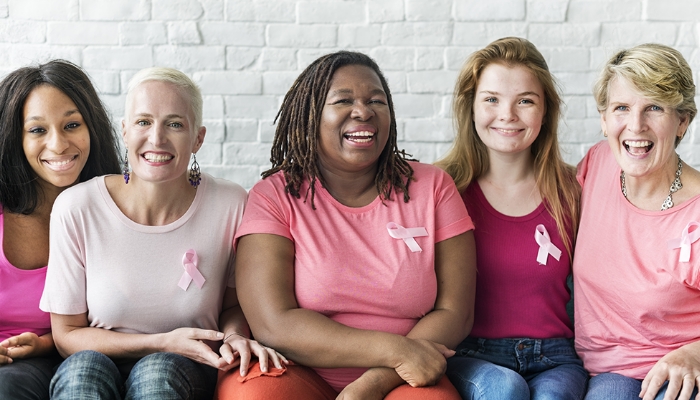 October is Breast Cancer Awareness Month, and to bring attention and awareness to the disease people often adopt the pink colour and display a pink ribbon in aid of "Pink October." This campaign effort seeks to educate people about methods of prevention and early detection and often, they raise money to support research around the world.
October is Breast Cancer Awareness Month, and to bring attention and awareness to the disease people often adopt the pink colour and display a pink ribbon in aid of "Pink October." This campaign effort seeks to educate people about methods of prevention and early detection and often, they raise money to support research around the world.
In 2020, there were 2.3 million women diagnosed with breast cancer worldwide1 while men make up just under 1% of diagnoses2 - this makes it the world’s most common type of cancer for women.
It occurs in individuals who have no known risk factors (e.g. alcohol abuse, family history, and obesity). The risk of developing breast cancer increases with age, and it is most common in people aged fifty or over3. Living with breast cancer can cause distress and uncertainty4 throughout all stages of the illness: from being in the process of potentially receiving a diagnosis, to undergoing treatment, to adjusting to life post-treatment. Most people think of the physical effects of breast cancer first and yet the psychological impact of a diagnosis is often also quite significant for individuals.
Receiving a diagnosis of breast cancer can be traumatic. It can be difficult to know where to turn for help and after the initial shock of diagnosis, a significant amount of distress continues throughout treatment and after treatment has ended. During treatment, new challenges can emerge such as strains in relationships, fatigue, ongoing worry related to symptoms and treatment. When faced with a potentially life-threatening illness, it is also natural to have acute concerns about our own mortality. Undergoing treatment for breast cancer may also come with extra life adjustments such as needing to cut back or give up work and additional financial strains compounding the stresses of undergoing treatment.
Factors like these can contribute to an increase in stress and to individuals experiencing common mental health difficulties such as anxiety, and depression. Major depression is one of the most common psychological disorders in cancer patients5. Anxiety is another common disorder among individuals with breast cancer6. Untreated depression and anxiety can set back recovery and decrease quality of life7.
Cognitive behavioural therapy (CBT) has been shown to be effective in treating depression and anxiety among cancer survivors8. Yet, many cancer survivors cannot access psychological therapies and remain untreated. Attending appointments in person may be a challenge for some, especially at a time of heightened concern regarding exposure to COVID-19. Some people fail to recognise that their psychosocial needs are not met. There is also a lack of mental health clinicians available9. Online CBT programmes have the potential of overcoming these barriers to accessing evidence-based psychological therapies.
Space in Breast Cancer from Depression and Anxiety is designed to support the mental health of individuals who are currently undergoing breast cancer treatment or who have survived breast cancer by:
- Educating survivors about breast cancer and its psychological impact.
- Providing evidence-based strategies and effective coping skills to deal with low mood and worries.
- Promoting a sense of personal agency and control to improve their adjustment to life during and following treatment.
The programme is accessible 24/7. Allowing users to access the programme at a time that suits them and in the comfort of their own home.
References
1. World Health Organization. (2021, March 26). Breast cancer. World Health Organization. Retrieved October 5, 2022, from https://www.who.int/news-room/fact-sheets/detail/breast-cancer
2. Howlader, N. N. A. M., Noone, A. M., Krapcho, M., Miller, D., Brest, A., Yu, M., ... & Cronin, K. A. (2020). SEER cancer statistics review, 1975–2017. National Cancer Institute, 4.
3. World Health Organization. (2021, March 26). Breast cancer. World Health Organization. Retrieved October 5, 2022, from https://www.who.int/news-room/fact-sheets/detail/breast-cancer
4. Fortin, J., Leblanc, M., Elgbeili, G., Cordova, M. J., Marin, M. F., & Brunet, A. (2021). The mental health impacts of receiving a breast cancer diagnosis: A meta-analysis. British Journal of Cancer, 125(11), 1582-1592.
5. Croyle, R. T., & Rowland, J. H. (2003). Mood disorders and cancer: A National Cancer Institute perspective. Biological Psychiatry, 54(3), 191-194.
6. Hopko, D. R., Lejuez, C. W., Ryba, M. M., Shorter, R. L., & Bell, J. L. (2016). Support for the efficacy of behavioural activation in treating anxiety in breast cancer patients. Clinical Psychologist, 20(1), 17-26.
7. Niedzwiedz, C. L., Knifton, L., Robb, K. A., Katikireddi, S. V., & Smith, D. J. (2019). Depression and anxiety among people living with and beyond cancer: a growing clinical and research priority. BMC cancer, 19(1), 1-8.
8. Moorey, S., & Greer, S. (2011). Oxford guide to CBT for people with cancer. OUP Oxford.
9. Ye, M., Du, K., Zhou, J., Zhou, Q., Shou, M., Hu, B., ... & Liu, Z. (2018). A meta‐analysis of the efficacy of cognitive behavior therapy on quality of life and psychological health of breast cancer survivors and patients. Psycho‐oncology, 27(7), 1695-1703.








